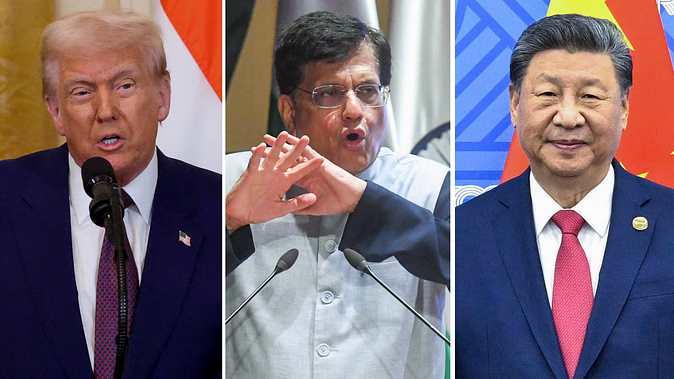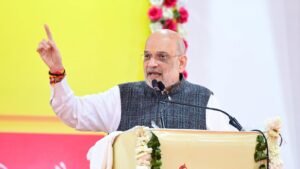China vs US: China accuses US of bullying; Said – impact of tariffs but ‘no sky will fall’

New Delhi| Countries around the world are trying for a possible agreement after US President Donald Trump announced tariffs last week. Meanwhile, China’s stance is slightly different. Within 48 hours of Trump’s announcement of tariffs affecting the market, the world’s second-largest economy retaliated by imposing punitive tariffs on U.S. goods and companies.
China has now given a clear message that it is fully prepared to face the trade war. Those who understand China believe that it will emerge stronger from this challenging situation. China on Monday accused the US of unilateralism, protectionism and economic bullying through tariffs. “Prioritizing the U.S. over international rules is an example of unilateralism, protectionism and economic bullying”, Foreign Affairs spokesman Lin Xian told reporters
Trump announced sweeping tariffs last week. In response, China had also announced to impose tariffs on America. Lin said the new tariffs have damaged the stability of global production and supply chains. According to Lin, this has had a serious impact on the world economic recovery.
China has expressed its displeasure with the strictness against America after the announcement of American tariffs. Through government media coverage and statements during the weekend, China has made its stand clear to the people of its countries as well as the entire world. “U.S. tariffs will have an impact (on China), but ‘the sky will not fall'”, the ruling Chinese Communist Party mouthpiece People’s Daily said in a comment published.
China’s government said, “Since the U.S. launched the (first) trade war in 2017-we don’t care how the U.S. fights or presses-we have continued to grow and progress, showing resilience”. The more pressure we get, the stronger we get”
Trump on Wednesday announced an additional 34% tariff on all Chinese goods imported into the U.S. Duty on all Chinese imports into the U.S. will exceed 54% when the current tariff is applied. In response, on Friday, Beijing announced a 34% tariff on all US imports. Along with this, China also announced control on the export of rare minerals and ban on trade of certain American companies.
Beijing has long criticized US tariffs as ‘unilateral bullying’. Its latest rhetoric could also serve to calm potential panic at home and reassure the rest of the world. But it is clear from China’s stand that which political calculations their leader Xi Jinping and his close ones in Beijing are engaged in. They are also working on other options by not finding a solution to Trump’s tariffs only through negotiations. Experts believe that America may suffer more losses than China due to the current tariff crisis.
“Many (People’s Republic of China) counterparts have argued that the U.S. is making a mistake that would undermine its own global position”, Ryan Hus, senior fellow at the Washington-based Brookings Institution think tank, wrote on social media platform X on Sunday after meetings with government officials, scholars, business leaders during a visit to China

He said, “There is a debate going on whether the world is entering a new phase of factionalism? Will further globalization happen without America’s interference? Beijing seems to be looking for an answer to the second question. China’s leaders won’t tolerate the U.S. giving a passive response”
How is China preparing to compete with America?
Both America’s friends and enemies have become the target of Trump’s tariffs. Taking advantage of this opportunity, China is considering presenting itself as an alternative champion for the global market and protector of the entire world economy in the coming times. He wants to give the message that after that there is prosperity for the countries of the world. China also wants to present itself to countries around the world as a stable economic partner compared to America. “As the world’s second-largest economy and second-largest consumer market, China will continue to open its doors more regardless of the changing international landscape”, China’s foreign ministry said in a statement Saturday
On Sunday, China’s Commerce Ministry deputy minister Ling Ji met with representatives of 20 U.S. funded enterprises, including Tesla and GE Healthcare, according to a ministry statement. Ling described China as an ‘ideal, safe and promising’ place to invest. He called on US businesses to ‘be rational voices’ and ‘take practical action’ to maintain the stability of global production and supply chains. Speaking to Chinese state broadcaster CCTV on Saturday, economic experts also stressed the view that this change in trade is an opportunity for Beijing.
China’s message – America’s bullying cannot be tolerated
“China is sending an important message to the world”, Liu Zhikin, a senior researcher at the Chongyang Institute for Finance Studies at Renmin University in China, told the broadcaster. That message is that we cannot tolerate America’s bullying, because tolerance ultimately leads to the specter of more bullying”
“China and the US are now direct rivals in reshaping the international trade order”, said Xu Jiandong, a professor at Tsingua University’s People’s Bank of China School of Finance. We are ready to take up the challenge. We are ready to compete with the U.S. in redefining the new global trading system”
However, China’s trading partners will not take such a message very seriously. Beijing has been using access to its vast market as a weapon to force countries. Beijing’s resentment is often exacerbated by political stances. Many countries are also carefully considering whether Chinese exports are going to grow in their own markets. Will this cause damage to their own domestic production or will it affect consumer prices.
But if given the ill effects of US tariffs, many countries of the world will have no option but to strengthen relations with China. Last month, Beijing held economic talks with Japan and South Korea. The US has imposed tariffs of 24% and 25% respectively on these countries last week. China itself has also negotiated with the European Union on which the Trump administration has imposed a 20% duty.









